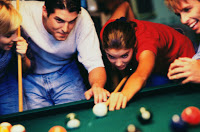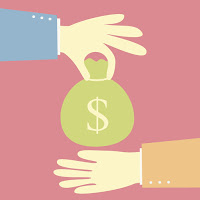Neuroscience
If you volunteer for a psychologist's experiment, it might involve nothing more exciting than answering some questions online, or maybe you'll be asked to remember a list of numbers. On the other hand, if you're brave and willing, the demands of the experiment could be far more challenging – back in March, we documented 10 of the most hellish psychology studies ever conducted. You'll be glad you didn't participate in those! But now it's time to look at the lighter end of the spectrum. For this post, we searched the annals of psychology for studies that sounded simply heavenly, from swimming with dolphins to receiving a free back massage! Not only do some of the methods sound delightful, in some cases the findings are pretty surprising too:
 1. Go swimming with dolphins
1. Go swimming with dolphins
It's a hard life being a psychology participant, but somebody has to do it. In this research from 2001, psychologists asked dozens of participants in groups of four, to swim with four wild dolphins in the ocean off a beach in Australia. The participants completed well-being measures before and after the experience and the change in their scores was compared to a control group who went swimming after the dolphins had gone. Although the dolphin group felt more positive after their experience than the control group, they'd actually started out feeling more positive, so they didn't enjoy a greater gain than the control group. Sceptics have pointed out that most research on the benefits of swimming with dolphins has lacked methodological rigour. Writing in 2007 [pdf], Lori Marino and Scott Lilienfeld warned that: "The surprising paucity of scientific evidence for the long-term effects of DAT [dolphin-assisted therapy] raises profoundly troubling ethical questions regarding its widespread use and promotion."
 2. Have a beer and play billiards with your mates
2. Have a beer and play billiards with your mates
The students taking part in this Dutch study were paid €30 to spend a few hours hanging out with a group of friends in a "bar lab" at the university. The students were asked to watch a few adverts on a TV in the bar and then chat about them with their friends. After this, they were free to chill out, order any drinks they wanted and play games. "To create a similar atmosphere as in a real bar," the researchers explain, "popular music was played, nuts were offered and participants were allowed to smoke, and to play table-soccer or billiards during the break." Earlier, the participants had rated what they thought a typical tea-totaller was like, a typical social drinker and a typical heavy drinker (e.g. how boring, how immature, how cool etc). Students who held more positive views of a typical heavy drinker tended to order more alcoholic drinks at the bar (even after controlling for the influence of their friends). Rounding off this particularly cushy research gig, taxis took home any students who were over the drink-drive limit by the end of the study.
 3. Play games for the chance to win half a year's salary
3. Play games for the chance to win half a year's salary
It's fairly common for psychology research participants to be offered modest incentives for better performance on a test, such as a book voucher or a ticket for a lottery. But imagine being offered the equivalent of half a year's salary. That was the prize on offer for some participants in research conducted by Dan Ariely and his colleagues in 2002 in an Indian village [pdf]. If participants in this peak bonus condition achieved a "very good" performance on a game (involving creativity, memory or darts skills), they would receive 400 Rupees – the local equivalent of nearly half a year's average salary (this was feasible for the researchers to offer because the cost of living was so low in India at the time compared with the US). This sounds like an amazing incentive, but actually Ariely's counter-intuitive finding was that massive cash bonuses backfire: participants in the conditions with more modest bonuses actually performed better. "Beyond some threshold level, it appears, raising incentives may increase motivation to supra-optimal levels and result in perverse effects on performance," the researchers concluded.
 4. Have more sex
4. Have more sex
Plenty of research has revealed a rather unsurprising correlation – people who are happier report having more sex. But of course the causal direction could go either way (or the correlation could be explained by other factors that increase both happiness and frequency of sex). To find out if sex boosts happiness, George Loewenstein and his colleagues recruited 70 heterosexual married couples aged between 35 and 65 and instructed them to have more sex (none of them reported any relevant sexual problems that might complicate the results). To take part, the couples' current frequency of sex had to lie somewhere between once a month and three times a week. The simple instruction to the couples was to double their usual frequency for the next 90 days. Surveys completed before, during and after the study showed, contrary to the researchers' expectations, that although people instructed to have more sex did have more sex, they actually suffered reductions in happiness and the enjoyment of sex, as compared with a control group. "Perhaps being in the experimental treatment changed couple members’ construal of sex, from a voluntary activity engaged in for pleasure to a duty, engaged in at the behest of the experimenter," the researchers concluded.
5. Eat toffee made at one of the world's most famous restaurants
Many psychology experiments give participants an excuse to sample chocolate, ice cream and other naughty delights. But this study is more heavenly than most in the genre because it involved paying participants to eat some toffee prepared at the experimental kitchen attached to chef Heston Blumenthal's (pictured, right) famous Fat Duck restaurant. As the participants tasted the toffee, they were either played low-pitched brass instrumental music specially prepared to be congruent with bitter taste or higher-pitched piano music selected to be congruent with sweetness. The participants' experience of the toffee varied depending on the music they were listening to at the time they tasted it – specifically, they described the toffee as sweeter when it was accompanied by the piano music. This shows "the taste of a food can be systematically altered by playing a soundscape that shares a crossmodal correspondence with the taste in question," the researchers said.
 6. Spend three weeks on a wilderness adventure
6. Spend three weeks on a wilderness adventure
A growing body of evidence suggests that spending time in nature has a range of psychological benefits, a phenomenon that people seem to underestimate. Many studies involve short walks in the countryside or urban parks – this paper from 2000 (pdf) took things to another level by studying students enrolled in 21-day wilderness courses in the Superior National Park in Minnesota: over 6000 square miles of woods and water. Compared with control students who stayed at home, the 68 students who enjoyed the wilderness experienced increases in feelings of connection with nature and in self-efficacy (belief in one's own abilities) – moreover, later interviews suggested significant spill-over of this beneficial effect into everyday life. Unfortunately, because the wilderness programmes were multifaceted, involving skills training (e.g. canoeing, leadership) as well as time in nature, it's not possible to isolate the active ingredients of the programmes.
 7. Get paid to laugh
7. Get paid to laugh
OK, if you're not a Michael McIntyre fan, this recent study might not be heavenly to you. But for the rest of us who do enjoy Britain's most popular comedian, this would have been a great study to sign up to – you're basically getting paid to have a chuckle. Student participants in the "comedy condition" each received £10 cash to watch 10 minutes of McIntyre's comedy TV show and then they were asked to write down personal details of themselves that they'd be willing to share with other participants. Compared with participants who watched a nature video or golf instruction clip, those who watched the funny video were prepared to share more intimate details about themselves. "Given laughter’s ability to trigger endorphin activation and the role of endorphins in the formation of social bonds, laughter may increase willingness to disclose intimate information because the opioid effect of endorphins makes individuals more relaxed about what they communicate," the researchers said.
 8. Pop this Bubble Wrap!
8. Pop this Bubble Wrap!
Squeezing the air-filled pockets of packaging until they pop is peculiarly satisfying. There's even a Bubble Wrap Appreciation Day (January 25) listed in the Chase Calendar of Events! Back in 1992 psychologist Kathleen Dillon, then at Western New England College, gave 30 undergrads the perfect excuse to pop two sheets of "sealed plastic air-capsules" (AKA Bubble Wrap) – it was for science. Comparing their mood pre and post the popping, Dillon found that the experience left the participants feeling more energised, less tired and more calm (there were no effects on tension). Another detail: the students enjoyed popping larger sized Bubble Wrap (with 3-cm bubbles) compared with the smaller size (.9-cm bubbles). Dillon's theory is that popping Bubble Wrap releases stress-related "muscle inhibition" much like tapping a finger or foot wiggling.
 9. Have six free massages
9. Have six free massages
For this study published in the 90s, 18 lucky employees at a large US manufacturing firm received a weekly 15-minute "chair massage" (targeting their head, neck, shoulder, back, arms and hands) from a trained masseuse for six weeks. Control group participants spent the same time each week simply taking a 15-minute break from work. Tension was high at the firm because it was undergoing downsizing. The massage participants showed significant reductions in their anxiety levels compared with the control group. This was true during the 6-week intervention period and also three weeks after it had ended. "Stress and anxiety in the workplace have been a common and pervasive problem," the researchers said. "From a cost perspective, finding effects from a weekly 15-minute massage is quite encouraging."
 10. Be prayed for by 12 religious congregations
10. Be prayed for by 12 religious congregations
We couldn't cover heavenly psychology studies without a single mention of the big guy upstairs. This study involved 371 heart surgery patients. OK, you obviously wouldn't want to be in their situation, but if you were, it might be nice to know lots of people were praying for you to get better, and in this study the patients' well-being was prayed for by no fewer than 12 religious congregations, including Christian, Muslim, Jewish, and Buddhist groups. The idea was to see if these prayed-for patients' health improved more quickly in the six months after their operation than 377 similar patients who weren't prayed for. In fact the prayed-for group fared no better. At the time, lead researcher Mitchell Krucoff at Duke University was keeping the faith. He told Reuters that “This is not ‘God failed the test’ or ‘God passed the test’…it’s way too early”. There were methodological problems with the study, including the fact that many patients in the control group said friends and family would likely be praying for them.
Which heavenly studies did we miss? Please add any suggestions to the comments and maybe we'll publish a sequel. And remember to check out our companion post on 10 hellish studies.
_________________________________
Post written by Christian Jarrett (@psych_writer) for the BPS Research Digest.
Our free fortnightly email will keep you up-to-date with all the psychology research we digest: Sign up!
- Practising Self-control With A Squeezy Handgrip Boosted These Students' Grades
It doesn't matter how brainy you are, if you don't make any effort, you're not going to do well at university (let's put aside the annoying few who seem to defy this rule by gliding through their studies). Indeed, psychologists are paying...
- Need A Wii? Games Console Found To Reduce Loneliness In The Elderly
The marketing people would have us believe that the Nintendo Wii is unlike traditional video games. It has an intuitive controller, they say, that allows you to simulate in-game movements, thus making it an ideal platform for active, social...
- Seven Ways To Be Good: 4) Practise Self-control
Willpower is like a muscle – the more you train it, the more powerful it will become, thus helping you to resist the Seven Deadly Sins. For example, in a study published last year, Mark Muraven at the University of Albany had a subset of participants...
- Could Prayers Be Harmful?
An American study has suggested prayer could sometimes do more harm than good. Herbert Benson and colleagues followed the fortunes of nearly 2000 heart surgery patients between 1998 and 2000, some of whom they arranged to be prayed for by three Christian...
- The God Ingredient
Meditation can reduce heart rate, lower blood pressure and improve mental health, thus relieving the harmful effects of stress. But does it matter whether the meditation is spiritual in nature or not? A study by Amy Wachholtz and Kenneth Pargament at...
Neuroscience
10 heavenly psychology studies you'll wish you'd participated in
If you volunteer for a psychologist's experiment, it might involve nothing more exciting than answering some questions online, or maybe you'll be asked to remember a list of numbers. On the other hand, if you're brave and willing, the demands of the experiment could be far more challenging – back in March, we documented 10 of the most hellish psychology studies ever conducted. You'll be glad you didn't participate in those! But now it's time to look at the lighter end of the spectrum. For this post, we searched the annals of psychology for studies that sounded simply heavenly, from swimming with dolphins to receiving a free back massage! Not only do some of the methods sound delightful, in some cases the findings are pretty surprising too:

It's a hard life being a psychology participant, but somebody has to do it. In this research from 2001, psychologists asked dozens of participants in groups of four, to swim with four wild dolphins in the ocean off a beach in Australia. The participants completed well-being measures before and after the experience and the change in their scores was compared to a control group who went swimming after the dolphins had gone. Although the dolphin group felt more positive after their experience than the control group, they'd actually started out feeling more positive, so they didn't enjoy a greater gain than the control group. Sceptics have pointed out that most research on the benefits of swimming with dolphins has lacked methodological rigour. Writing in 2007 [pdf], Lori Marino and Scott Lilienfeld warned that: "The surprising paucity of scientific evidence for the long-term effects of DAT [dolphin-assisted therapy] raises profoundly troubling ethical questions regarding its widespread use and promotion."

The students taking part in this Dutch study were paid €30 to spend a few hours hanging out with a group of friends in a "bar lab" at the university. The students were asked to watch a few adverts on a TV in the bar and then chat about them with their friends. After this, they were free to chill out, order any drinks they wanted and play games. "To create a similar atmosphere as in a real bar," the researchers explain, "popular music was played, nuts were offered and participants were allowed to smoke, and to play table-soccer or billiards during the break." Earlier, the participants had rated what they thought a typical tea-totaller was like, a typical social drinker and a typical heavy drinker (e.g. how boring, how immature, how cool etc). Students who held more positive views of a typical heavy drinker tended to order more alcoholic drinks at the bar (even after controlling for the influence of their friends). Rounding off this particularly cushy research gig, taxis took home any students who were over the drink-drive limit by the end of the study.

It's fairly common for psychology research participants to be offered modest incentives for better performance on a test, such as a book voucher or a ticket for a lottery. But imagine being offered the equivalent of half a year's salary. That was the prize on offer for some participants in research conducted by Dan Ariely and his colleagues in 2002 in an Indian village [pdf]. If participants in this peak bonus condition achieved a "very good" performance on a game (involving creativity, memory or darts skills), they would receive 400 Rupees – the local equivalent of nearly half a year's average salary (this was feasible for the researchers to offer because the cost of living was so low in India at the time compared with the US). This sounds like an amazing incentive, but actually Ariely's counter-intuitive finding was that massive cash bonuses backfire: participants in the conditions with more modest bonuses actually performed better. "Beyond some threshold level, it appears, raising incentives may increase motivation to supra-optimal levels and result in perverse effects on performance," the researchers concluded.

Plenty of research has revealed a rather unsurprising correlation – people who are happier report having more sex. But of course the causal direction could go either way (or the correlation could be explained by other factors that increase both happiness and frequency of sex). To find out if sex boosts happiness, George Loewenstein and his colleagues recruited 70 heterosexual married couples aged between 35 and 65 and instructed them to have more sex (none of them reported any relevant sexual problems that might complicate the results). To take part, the couples' current frequency of sex had to lie somewhere between once a month and three times a week. The simple instruction to the couples was to double their usual frequency for the next 90 days. Surveys completed before, during and after the study showed, contrary to the researchers' expectations, that although people instructed to have more sex did have more sex, they actually suffered reductions in happiness and the enjoyment of sex, as compared with a control group. "Perhaps being in the experimental treatment changed couple members’ construal of sex, from a voluntary activity engaged in for pleasure to a duty, engaged in at the behest of the experimenter," the researchers concluded.
 |
| Image: Brian Minkoff |
Many psychology experiments give participants an excuse to sample chocolate, ice cream and other naughty delights. But this study is more heavenly than most in the genre because it involved paying participants to eat some toffee prepared at the experimental kitchen attached to chef Heston Blumenthal's (pictured, right) famous Fat Duck restaurant. As the participants tasted the toffee, they were either played low-pitched brass instrumental music specially prepared to be congruent with bitter taste or higher-pitched piano music selected to be congruent with sweetness. The participants' experience of the toffee varied depending on the music they were listening to at the time they tasted it – specifically, they described the toffee as sweeter when it was accompanied by the piano music. This shows "the taste of a food can be systematically altered by playing a soundscape that shares a crossmodal correspondence with the taste in question," the researchers said.
A growing body of evidence suggests that spending time in nature has a range of psychological benefits, a phenomenon that people seem to underestimate. Many studies involve short walks in the countryside or urban parks – this paper from 2000 (pdf) took things to another level by studying students enrolled in 21-day wilderness courses in the Superior National Park in Minnesota: over 6000 square miles of woods and water. Compared with control students who stayed at home, the 68 students who enjoyed the wilderness experienced increases in feelings of connection with nature and in self-efficacy (belief in one's own abilities) – moreover, later interviews suggested significant spill-over of this beneficial effect into everyday life. Unfortunately, because the wilderness programmes were multifaceted, involving skills training (e.g. canoeing, leadership) as well as time in nature, it's not possible to isolate the active ingredients of the programmes.

OK, if you're not a Michael McIntyre fan, this recent study might not be heavenly to you. But for the rest of us who do enjoy Britain's most popular comedian, this would have been a great study to sign up to – you're basically getting paid to have a chuckle. Student participants in the "comedy condition" each received £10 cash to watch 10 minutes of McIntyre's comedy TV show and then they were asked to write down personal details of themselves that they'd be willing to share with other participants. Compared with participants who watched a nature video or golf instruction clip, those who watched the funny video were prepared to share more intimate details about themselves. "Given laughter’s ability to trigger endorphin activation and the role of endorphins in the formation of social bonds, laughter may increase willingness to disclose intimate information because the opioid effect of endorphins makes individuals more relaxed about what they communicate," the researchers said.

Squeezing the air-filled pockets of packaging until they pop is peculiarly satisfying. There's even a Bubble Wrap Appreciation Day (January 25) listed in the Chase Calendar of Events! Back in 1992 psychologist Kathleen Dillon, then at Western New England College, gave 30 undergrads the perfect excuse to pop two sheets of "sealed plastic air-capsules" (AKA Bubble Wrap) – it was for science. Comparing their mood pre and post the popping, Dillon found that the experience left the participants feeling more energised, less tired and more calm (there were no effects on tension). Another detail: the students enjoyed popping larger sized Bubble Wrap (with 3-cm bubbles) compared with the smaller size (.9-cm bubbles). Dillon's theory is that popping Bubble Wrap releases stress-related "muscle inhibition" much like tapping a finger or foot wiggling.

For this study published in the 90s, 18 lucky employees at a large US manufacturing firm received a weekly 15-minute "chair massage" (targeting their head, neck, shoulder, back, arms and hands) from a trained masseuse for six weeks. Control group participants spent the same time each week simply taking a 15-minute break from work. Tension was high at the firm because it was undergoing downsizing. The massage participants showed significant reductions in their anxiety levels compared with the control group. This was true during the 6-week intervention period and also three weeks after it had ended. "Stress and anxiety in the workplace have been a common and pervasive problem," the researchers said. "From a cost perspective, finding effects from a weekly 15-minute massage is quite encouraging."

We couldn't cover heavenly psychology studies without a single mention of the big guy upstairs. This study involved 371 heart surgery patients. OK, you obviously wouldn't want to be in their situation, but if you were, it might be nice to know lots of people were praying for you to get better, and in this study the patients' well-being was prayed for by no fewer than 12 religious congregations, including Christian, Muslim, Jewish, and Buddhist groups. The idea was to see if these prayed-for patients' health improved more quickly in the six months after their operation than 377 similar patients who weren't prayed for. In fact the prayed-for group fared no better. At the time, lead researcher Mitchell Krucoff at Duke University was keeping the faith. He told Reuters that “This is not ‘God failed the test’ or ‘God passed the test’…it’s way too early”. There were methodological problems with the study, including the fact that many patients in the control group said friends and family would likely be praying for them.
Which heavenly studies did we miss? Please add any suggestions to the comments and maybe we'll publish a sequel. And remember to check out our companion post on 10 hellish studies.
_________________________________
Post written by Christian Jarrett (@psych_writer) for the BPS Research Digest.
Our free fortnightly email will keep you up-to-date with all the psychology research we digest: Sign up!
- Practising Self-control With A Squeezy Handgrip Boosted These Students' Grades
It doesn't matter how brainy you are, if you don't make any effort, you're not going to do well at university (let's put aside the annoying few who seem to defy this rule by gliding through their studies). Indeed, psychologists are paying...
- Need A Wii? Games Console Found To Reduce Loneliness In The Elderly
The marketing people would have us believe that the Nintendo Wii is unlike traditional video games. It has an intuitive controller, they say, that allows you to simulate in-game movements, thus making it an ideal platform for active, social...
- Seven Ways To Be Good: 4) Practise Self-control
Willpower is like a muscle – the more you train it, the more powerful it will become, thus helping you to resist the Seven Deadly Sins. For example, in a study published last year, Mark Muraven at the University of Albany had a subset of participants...
- Could Prayers Be Harmful?
An American study has suggested prayer could sometimes do more harm than good. Herbert Benson and colleagues followed the fortunes of nearly 2000 heart surgery patients between 1998 and 2000, some of whom they arranged to be prayed for by three Christian...
- The God Ingredient
Meditation can reduce heart rate, lower blood pressure and improve mental health, thus relieving the harmful effects of stress. But does it matter whether the meditation is spiritual in nature or not? A study by Amy Wachholtz and Kenneth Pargament at...
